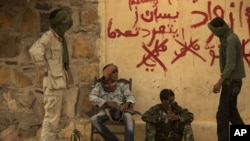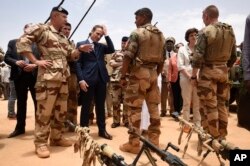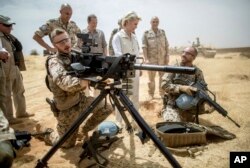The Permanent Strategic Framework for Peace, Security and Development, uniting the groups, urged civilians to move away from military facilities in an apparent prelude to conflict.
Adding to the tense atmosphere, the governorate of the eastern Gao region on Sunday said it had installed a nighttime curfew to run for 30 days between 8 p.m. and 6 a.m. with exemptions only for security vehicles.
The armed groups' statement followed a suicide attack Friday on a military base in northern Mali on Friday, which itself came a day after deadly strikes on an army camp and a passenger boat by suspected jihadists killed 64 people.
The region — the cradle of a jihadist insurgency that has swept into three Sahel nations — has seen a resurgence of tension in recent weeks, triggered in part by the pullout of United Nations peacekeeping troops from Mali.
Landlocked, impoverished Mali has been struggling with insecurity since 2012 when a revolt led by ethnic Tuaregs erupted in the north of the country.
The northern rebellion was formally ended by a peace agreement signed between the region's rebels and the Malian government in 2015.
However, the fragile deal came under strain after the civilian government was toppled in 2020 and replaced by a junta.
The Coordination of Azawad Movements, CMA, — a coalition of Tuareg independence and Arab nationalist groups which is one of the parties to the strategic Framework — said late Saturday it had shot down an army plane after its positions were bombarded in the Gao region.
The army referred to an "incident" without giving further details.
The framework has in recent weeks denounced several violations of the 2014 ceasefire and the 2015 peace accord and also slammed what it termed the junta's "current ceasefire strategy" seeing that as designed to rupture it, warning it would have to resort to "all measure of legitimate defense" across the northern Azawad region.
'Pretext'
The framework groups worry that the withdrawal of U.N. troops may give the junta a "pretext" to reoccupy zones which the 2014 and 2015 deals had ceded from central control.
After the U.N. peacekeepers quit their base last month there were clashes between troops and jihadists, but also between the army and the CMA.
The framework says that after the base was vacated the army and Russian Wagner paramilitaries which it considers terrorists visited violence including summary executions and abuses including arbitrary arrest and looting on locals.
The framework was created in May 2021 by the main northern armed groups who inked the 2015 peace deal which is now generally considered moribund.
The jihadists, who first fought the army alongside Tuareg and Arab rebels before turning against them, are not affected by the accord and have spread their operations to central Mali and Burkina Faso.



Forum